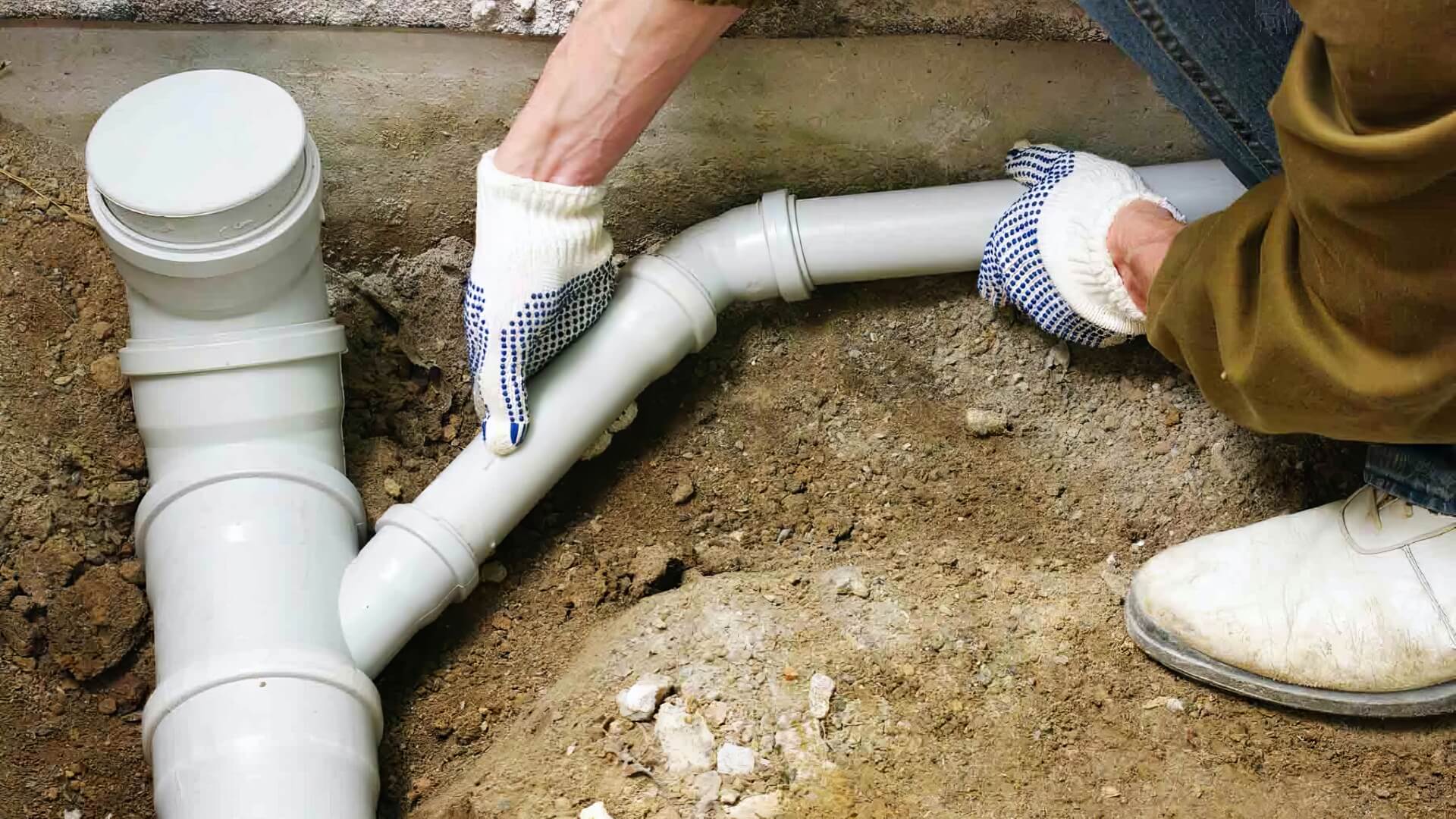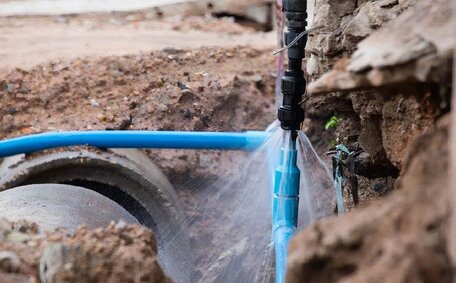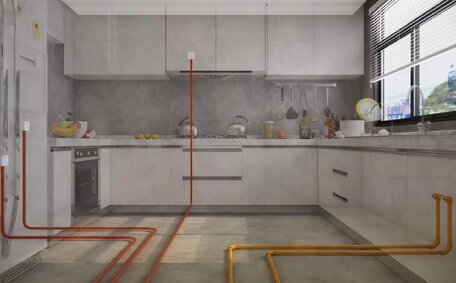Preparing for Plumbing Emergencies to Keep Pets Safe
Responsiveness in plumbing emergencies is crucial to promote your pets’ safety and welfare.
A burst pipe or gas leak poses a significant risk to your furry friends, who may be exposed to toxic fumes or flooding.
Start by assessing your plumbing to identify potential hazards around your property. Are there exposed pipes or wires that your responsible cat could chew on, putting their safety at risk? Do you store cleaning products under the sink where your dog could get into them? Ensure that you cover, secure, or relocate any exposed hazards to eliminate risks.
You should also know where your main water line and your gas shut off valves are located so you can quickly turn them off if a leak occurs.
Prepare an emergency kit for your pets, including a three-day supply of food and water, medications, vaccination records, securely stored in waterproof containers. Heeding smart plumbing tips, like having go bags ready with essentials will make evacuating with your family and pets much smoother.
During a plumbing emergency, do your best to keep your pet secure outside or in a safe area of the house while repairs are in progress. Ensure they can reach potty spots, food, water, and their own spaces, like crates or beds. Organise same-day plumbing services to promptly address any flooding or gas leaks, safeguarding your home and pets.
Preventing Pets from Exacerbating Plumbing Issues
Careful planning of pet-proofing measures is essential, as pets can exacerbate minor plumbing issues. Flushing cat litter down the toilet, for instance, can cause clogs in your home’s pipework. Pet hair washing down bathroom drains during bath time can cause water flow issues with blockages that reduce pressure and obstruct drainage.
To prevent problems, practice good plumbing in your household by not flushing cat litter and ensuring the toilet lid remains securely closed. Installing drain covers helps prevent hair from clogging your pipework, safeguarding your bath and sink areas.
Regularly remove visible accumulations of pet hair.
The allure of scents and moisture may encourage pets to dig near outdoor water and sewer lines. If you spot suspicious holes outside your home, fill any near underground plumbing to dissuade further digging. Supervise your pet while they are outdoors to stop this behaviour.
Adopting plumbing tips for your gas fittings can save considerable money and frustration by preventing major issues. Your plumber can also advise on installing pet-friendly toilet seats, litter disposal units or automatic drain cleaners if you require extra prevention measures.
Securing Pets When Plumbers Arrive
It is imperative to keep pets secure away from areas requiring plumber access within your home.
Confine your cats and dogs to a room or crate with food, water, and bedding to start. Place small animals such as birds or hamsters in carriers. Attach a note to each crate or door indicating you have pets.
Before workers arrive, proactively call the plumbing company to notify them you have animals on the premises. Provide details on the type and number of pets so technicians can take precautions. Request the service team close doors and gates behind them to prevent curious pets from escaping.
While repairs are being made, regularly check on your pets to ensure they have what they need and are not showing signs of stress.
Minimise loud noises to prevent disturbing your pets, such as muting TVs and closing doors to work areas.
Take your pets outdoors for bathroom breaks if it is safe to do so without approaching the work zone. After repairs, you might provide treats for the technicians to give to sociable pets, ensuring hands are clean first. Ensure all tools, chemicals or debris have been removed before allowing pets to roam freely about the home again.
Communicating with Plumbers About Pet Safety
Inform your plumbing service upfront about any pets in your home when you call for repairs. Provide details on the number of animals, sizes, ages and temperaments. This allows technicians to take precautions so no pets get loose or disturbed during the work.
Inform technicians if large or protective dogs are present to prevent unwanted interactions.
Ensure crates and doors are properly secured. Identify hiding spots such as under beds to ensure your cats remain undisrupted. Request plumbers not open doors to these areas so pets stay safely confined.
Mark spaces housing birds or rodents so equipment vibrations don’t cause serious distress to them.
Ask workers to keepgates latched and avoid propping doors open for long periods of time to prevent wandering pets. Having open communication ensures everyone stays safe and at ease during plumbing repairs.
Pet-Proofing the Home
Effective pet-proofing is vital for keeping your animals safe during plumbing incidents. Secure your toilet with child locks and weighting mechanisms to prevent curious pets from opening the lid. Store all cleaning products and toxic chemicals in high or locked cabinets instead of under sinks.
Fit pressure balance valves in showers and tubs to protect your pets from hot water temperature spikes. Insulate all exposed pipes to create a protective barrier around pipes so pets won’t get burned if the pipe surface becomes too hot. Erect fences around outdoor areas with gas equipment or sewer access to deter pets.
Regularly trim foliage where pets can find and potentially damage outdoor plumbing components like irrigation lines or meter boxes. Backfill any holes pets have dug near underground pipework. Conduct a monthly check around your home perimeter for any signs of leaks or general wear.
Have a professional plumber annually inspect your home’s water heater, supply lines and drainage to check for issues like corrosion or cracks that could endanger your pets. They can also advise on installing flood sensors in at-risk rooms for early leak detection and containment.
Outdoor Considerations for Pet Safety
When enjoying the outdoors with your pets, it’s important to be aware of potential plumbing hazards on your property that could harm them. Underground pipelines, including those for water and gas, may crisscross your yard, posing risks to your pets. When enjoying the outdoors with your pets, it’s important to be aware of potential plumbing hazards on your property that could harm them.
Use flags or stakes to demarcate the locations of any visible water, gas, or sewer lines on your property.
Ponds, pools, and exterior hose bibs around your house should have fences or covers securing them so curious pets don’t accidentally fall in or damage plumbing fixtures while unattended in the yard. Be on the lookout for damp grass patches or odd smells that could signal underground leaks, enticing your animals.
When attending to your garden, ensure not to dig too deep near water and gas meters or the pipework leading into your home. Overgrown vegetation can obscure cracks or corrosion which could endanger your pets. Keep the perimeter of your home clear to enable regular safety inspections.
What to Do During a Plumbing Emergency
In plumbing crises, it’s vital for pet owners to take swift, protective action. Immediately move your pets away from the affected areas, such as floods, leaks, or burst pipes. Move them to a dry, safe room with fresh air if toxic fumes are present.
Don protective rubber gloves and shut off the water supply valve to mitigate damage. This will minimise water damage until plumbers can stop the leak. Call your local Hurstville Plumbing professionals immediately at 1300 349 338 for 24/7 emergency assistance. Make sure to mention you have pets on the premises.
While waiting for help, stop pets from walking through water to avoid slip hazards and contamination. Continue monitoring your animals for signs of stress and exposure to hazardous materials. Ventilate the home if carbon monoxide or gas leaks are suspected by opening windows.
Turn off any appliance pilot lights.
Upon technician arrival, promptly communicate your pets’ locations and any special requirements. Let plumbers know if any strange behaviours arise so action can be taken to reduce anxiety.
Stay alert even after the plumbers leave, as lingering dampness can promote mould growth. Use dehumidifiers and fans to dry your home and discourage mould growth. Call your vet for advice if concerns arise regarding their wellbeing. Thorough prep and vigilance will keep your pets secure in any plumbing predicament.






